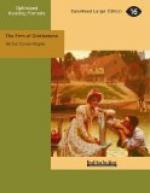“No, indeed,” his companion answered with enthusiasm. “I shall never forget them as long as I live.”
“Nor I,” said Tom earnestly. “You remember the day we had at the Pentlands?”
“And the drive round Arthur’s Seat.”
“And the time that we all went to Roslin and saw the chapel.”
“And the day at Edinburgh Castle when we saw the jewels and the armoury. But you must have seen all these things many times before? You could not have enjoyed it as much as we did for the first time.”
“Oh yes, I did,” Tom said stoutly, wondering to himself how it was that the easy grace with which he could turn compliments to maidens for whom he cared nothing had so entirely deserted him. “You see, Kate-well—you were not there when I saw them before.”
“Ah,” said Kate demurely, “what a beautiful day it is? I fancied in the morning that it was going to rain.”
Tom was not to be diverted from his subject by any meteorological observations. “Perhaps some time your guardian will allow the dad to take you on another little holiday,” he said hopefully.
“I’m afraid he won’t,” answered Kate.
“Why not?”
“Because he seemed so cross when I came back this last time.”
“Why was he cross?” asked Tom.
“Because—” She was about to say that it was because she had been brought in contact with him; but she recollected herself in time.
“Because what?”
“Because he happened to be in a bad temper,” she answered.
“It is too bad that you should have to submit to any one’s whims and tempers,” the young man said, switching his stick angrily backwards and forwards.
“Why not?” she asked, laughing. “Everybody has some one over them. If you hadn’t, you would never know right from wrong.”
“But he is unkind to you.”
“No, indeed,” said Kate, with decision. “He is really very kind to me. He may appear a little stern at times, but I know that he means it for my own good, and I should be a very foolish girl if I resented it. Besides, he is so pious and good that what may seem a little fault to us would appear a great thing in his eyes.”
“Oh, he is very pious and good, then,” Tom remarked, in a doubtful voice. His shrewd old father had formed his own views as to John Girdlestone’s character, and his son had in due course imbibed them from him.
“Yes, of course he is,” answered Kate, looking up with great wondering eyes. “Don’t you know that he is the chief supporter of the Purbrook Street Branch of the Primitive Trinitarians, and sits in the front pew three times every Sunday?”
“Ah!” said Tom.
“Yes, and subscribes to all the charitable funds, and is a friend of Mr. Jefferson Edwards, the great philanthropist. Besides, look how good he has been to me. He has taken the place of my father.”
“Hum!” Tom said dubiously; and then, with a little pang at his heart, “Do you like Ezra Girdlestone too?”




